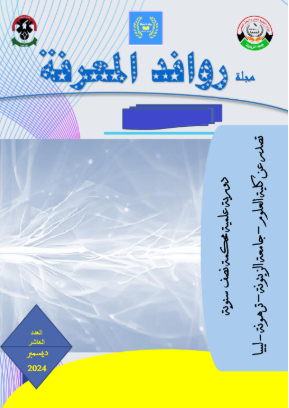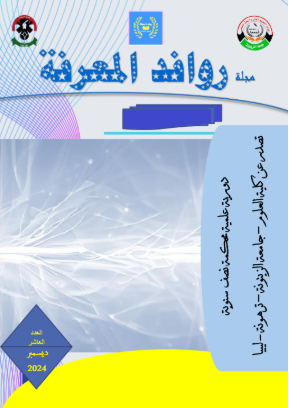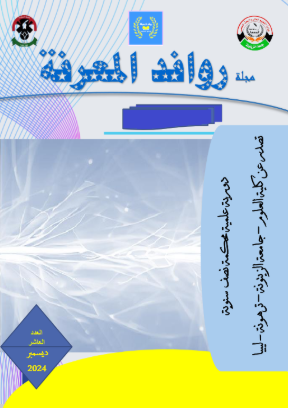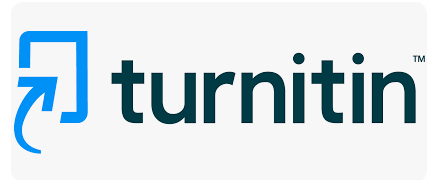Publishing Policies
In
ublication Policies – Rwafed Almarefa Journal
Introduction:
The editorial board of the journal " Rwafed Almarefa ", issued by the Faculty of Science at Al-Zaytouna University, is committed to the highest standards of academic integrity and scientific quality, so that these policies for publication in the journal aim to clarify the guidelines and procedures that govern the publication process in the journal, in order to ensure transparency and fairness for all parties involved: authors, reviewers, and readers. 1. Aims and Scope of the Journal " Rwafed Almarefa " is an international peer-reviewed, semi-annual scientific journal that aims to publish original, innovative, and high-quality research in various fields of basic, applied and humanities. The journal's areas of interest include but are not limited to: Mathematics and statistics. Computer Science and Information Technology. Physics (theoretical and applied). Chemistry (in all its branches). Life Sciences and Microbiology. Earth and environmental sciences. Interdisciplinary Scientific Disciplines. Humanities. Legal and Sharia Sciences. The journal accepts papers written in both Arabic and English, provided that the research includes a full abstract in the other language.
- Types of Manuscripts
The journal welcomes the following types of scientific contributions: Original Research Articles: Empirical or theoretical studies that provide new and important results. Review Articles: Comprehensive and up-to-date critical reviews of a particular topic within the journal's scope of interest (usually at the invitation of the editorial board, but proposals may be considered). Short Communications: Summary reports of preliminary but important results that warrant rapid publication. Case Reports: Detailed reports on individual cases of particular scientific interest.
- Publication Ethics The journal
" Rwafed Almarefa " adopts the guidelines issued by the Committee on Publication Ethics (COPE). All parties must commit to:
- Duties of the Authors:
Originality and Plagiarism: The submitted research must be an original work of the authors, and has not been previously published or submitted for publication elsewhere. The authenticity of the research is ascertained by examining all submitted research using specialized plagiarism detection software (such as Turnitin or Plagiarism Checker X), and any case of plagiarism will result in immediate rejection of the search and other action.
Authorship: The names of authors should be included only to those who have contributed significantly to the design, implementation, analysis of the data, or writing of the research. The corresponding author must ensure that all co-authors approve the final version of the research before submitting it.
Disclosure and Conflicts of Interest: Authors should disclose any conflicts of interest (financial or non-financial) that may affect the interpretation of their findings, and all sources of funding for the research should be mentioned.
Fundamental errors in published works: If the author discovers a material error in his published research, he must immediately inform the editorial board to correct the error or withdraw the research. Research ethics: In the case of research involving human participants or the use of experimental animals, authors must demonstrate that they have obtained the necessary ethical approvals from the relevant committees in their institutions.
- Duties of the Arbitrators:
Confidentiality: Reviewers must treat the research sent to them with complete confidentiality and not share it with any third party. Objectivity: The review should be objective and constructive, while avoiding personal criticism. Conflict of Interest: The reviewer must apologize for reviewing any research in which there is a conflict of interest resulting from competitive or collaborative relationships with any of the authors. Timekeeping: A reviewer who is unable to complete the review on time must inform the editorial board.
- Duties of the Editorial Board:
Publication Decision: The Editorial Board makes the decision to accept or reject the research based on the reports of the reviewers, the importance of the research, its originality, and its suitability for the scope of the journal, noting that the decision is final and cannot be appealed. Fairness and Integrity: All research is evaluated solely on its scientific content, regardless of the authors' race, gender, religion, nationality, or institutional affiliation. Confidentiality: The editorial board is committed to maintaining the confidentiality of information related to the submitted research papers and the reviewers.
- Peer Review Process:
The journal follows a double-blind peer review policy, where the identity of the authors is unknown to the reviewers, and the identity of the reviewers is unknown to the authors, and the process is carried out according to the following steps:
1.Initial Screening: The Editor-in-Chief or a member of the Editorial Board examines the submitted research to ensure that it conforms to the scope of the journal, its policies, and its general format, and the research may be rejected at this stage if it is inappropriate or lacks the required quality.
- Submission of research for review: The research that passes the preliminary examination is sent to two (or more) reviewers who specialize in the same field.
- Referees' Reports: Referees submit detailed reports that include their evaluation of the research and their recommendations.
- Editorial Decision: Based on the reports of the reviewers, the Editorial Board makes one of the following decisions:
Acceptance: The research is accepted for publication as is.
Acceptance with minor revisions: The author is required to make minor revisions. Acceptance with Major Revisions: The author is required to make significant revisions, and the paper may be sent back to the reviewers.
Rejection: The research is rejected because it does not meet the criteria for publication in the journal.
5.Final Decision: The author is informed of the final decision with the referees' feedback (anonymously).
- Author Guidelines:
To ensure a smooth review and publication process, authors are requested to adhere to the following guidelines when preparing their research:
Research Language: Arabic or English.
File format: The search must be submitted in a Microsoft Word file.
Research Structure: The research should include the following sections in order:
Title page: Research title, authors' names, institutional affiliations, email to the corresponding author.
Abstract: An abstract in Arabic (250 words maximum) and another in English (250 words maximum).
Keywords 4-6 Keywords.
Introduction
Materials and Methods
Results
Discussion
Conclusion
Acknowledgments (if applicable).
References Documentation Method: Authors must adhere to a standardized documentation method according to the APA (American Psychological Association).
Tables and figures: They should be numbered sequentially, indicated in the body of the text, and each table or figure should have a clear and concise title.
- Open Access Policy:
Rwafed Almarefa Journal believes in the importance of making knowledge available to all. The journal provides open access to all of its published content, allowing researchers and the public to view, download, and share research for free, while adhering to the rules of citing the original source.
- Copyright and Licensing: Authors retain full copyright to their work.
All articles in the journal are published under a Creative Commons Attribution License (CC BY-NC-SA 4.0). This license allows others to share (copy, distribute, and transmit) and adapt (modify, and build on the work) for non-commercial purposes, provided that the work is attributed to its original author and the derivatives are similarly licensed.
- Publication Fees:
The journal charges an article processing fee (APC) of 300 Libyan dinars to cover the costs of refereeing and digital production, for research with no more than 25 pages, and an amount of 25 Libyan dinars is paid for each page that exceeds the number of pages mentioned above, while an amount of 150 US dollars is paid for each research published in the journal for non-Libyan researchers, and this fee is paid only after the research is accepted for publication.
Contact and inquire: For any inquiries regarding publication policies, please contact the editorial board via email rwafed.almarefa@azu.edu.ly










